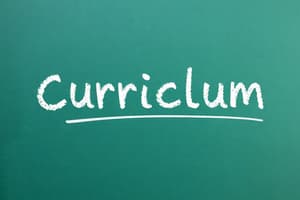Podcast
Questions and Answers
How do you feel today? (Select all that apply)
How do you feel today? (Select all that apply)
- Burnout (correct)
- Sad (correct)
- Gloomy (correct)
- Happy (correct)
- Excited (correct)
- Nonchalant (correct)
- Negative (correct)
- Other feelings (correct)
- Tired (correct)
- Positive (correct)
What are the types of curriculum?
What are the types of curriculum?
Formal, Informal, Hidden
What are the curriculum theories?
What are the curriculum theories?
Behavioral, Constructivist, Essentialist, Perennialist, Progressivist
What are the characteristics of a curriculum?
What are the characteristics of a curriculum?
Flashcards are hidden until you start studying
Study Notes
Types of Curriculum
- Formal curriculum: Officially prescribed courses and their content, typically published in educational policy documents.
- Informal curriculum: Unofficial learning experiences that occur outside the standard curriculum, including social interactions and extracurricular activities.
- Hidden curriculum: Unintended lessons, values, and norms conveyed through the school environment and culture rather than formal instruction.
Curriculum Theories
- Behavioral theory: Focuses on observable and measurable aspects of student learning; emphasizes reinforcement and behavior modification.
- Constructivist theory: Advocates that learners construct their own understanding and knowledge of the world through experiences and reflection.
- Critical theory: Encourages questioning and challenging established norms and ideologies within educational systems, promoting social change.
- Humanistic theory: Centers on individual student needs, emotions, and personal growth, prioritizing a supportive learning environment.
Characteristics of a Curriculum
- Clear objectives: Well-defined learning goals that guide instructional strategies and assessment.
- Coherence and alignment: Integration of content, skills, and assessment methods to ensure consistency and relevance.
- Flexibility: Adaptability to meet diverse student needs and respond to changes in educational contexts.
- Inclusivity: Recognizing and accommodating the diverse backgrounds, identities, and learning styles of all students.
- Continuous assessment: Ongoing evaluation of student progress to inform teaching practices and curriculum effectiveness.
Studying That Suits You
Use AI to generate personalized quizzes and flashcards to suit your learning preferences.




